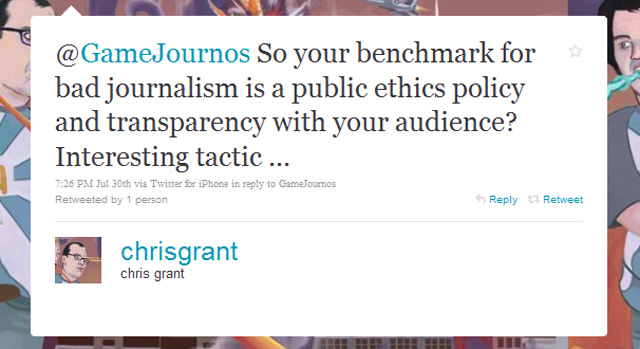
I don’t always agree with what I read on gaming websites. In fact, I’ve been known to rant (often) about the quality of the posts that appear on them. Do I care about your review of the gaming-branded potato chips you’re eating? Do I worry about the influence of David Hasselhoff on video games? Is it worth my while to read about what your top ten pre-rendered gamerboobs are? In most cases, NO — gamerboobs aside.
I’ve railed on Kotaku, IGN, Joystiq, Gamespot, Giant Bomb, Facebook groups, and podcasts. In some of those instances, the people I’ve been critical of were friends. In others, the hatemail was directed towards those I’ve had issue with.
Recently, I came to the conclusion (and realization) that I’ve been wasting my time.
Game Journalists Are Incompetent Fuckwits (GJAIF) is a blog created by writer/actor Ben Paddon outlining the general fails of videogame media. Paddon has noted via his personal blog that the site was created with his general distaste for some of the “dumb things gaming journalists do”. And admittedly, gaming journalists (like journalists, bloggers, and writers for every other industry) do manage to produce some bad work now and again. As more outlets are formed and people take up the pen — er, the keyboard — it can be safe to assume that not everyone has managed to graduate with a journalism degree, or even to have minored in basic English grammar. Paddon even maintains a similar blog showcasing the British public’s failures, But, Sir…
I’ve followed the Twitter account for the simple reason of reaffirming some of the issues that I’ve had in the past with various outlets. It’s an interesting read, even if I don’t agree with everything. And besides, it’s just an opinion, right?

But then I began to notice that it was starting to irk some journalists and outlets. Paddon, whether it was his goal or not, seemed to purposefully target publications to get a “rise” out of the writers. I point to this recent back-and-forth between Joystiq’s Chris Grant and GJAIF, referencing a preview written in 2009 for Modern Warfare 2. Other recent instances of rise-inducing were aimed at Kinect articles by MCV, or responses across Twitter.

Yes, GJAIF had essentially turned itself into a flame-bait house, hoping to stir up pots where it could. It pisses off writers, and does a good job of it. But, why should that matter?
I’ve dealt with flame-bait and fanboyism for a while now (and it should be noted, GJAIF has become a Jim Sterling fanboy recently) and while it annoyed and bothered me early on, it’s just an opinion. In most respects, it may not even have been a correctly-presented response — there were often grammatical errors in the comments from Grammar Nazis — and yet it managed to get me to pull my hair out at times. GJAIF is just a Digg-like collection of opinions, like those I had to sift through many a Saturday morning after a night of drunken blogging about the inefficiency of Social Media or Eastern European politics.
It wasn’t until recently that I “gave up” hating “bad” games journalism and realized that it wasn’t really bad, just not to my pleasure. And it wasn’t always journalism, but sometimes criticism or old-fashioned blogging. GJAIF hasn’t given up yet, fueled by the response from both fans of the site and writers of others, who are all-to-happy to stab each other in the back given an opportunity to make the competition look bad. It feeds off of what Paddon feel’s is incompetence, given his “experience” at being an editor himself and ability to discern the difference between the content.
The trouble with games journalists is that they still take this to heart, though they don’t admit it. The trouble with GJAIF is that it often can’t distinguish the relevance of the content in an article, misunderstanding the readership of a website and how it affects the content that is posted, whether it is good, bad, or simply bad ethical practice by the outlet. GJAIF sometimes really “reaches” to get a tidbit of bad journalism, making a flamboyant mountain out of an issue that isn’t even there. And, he often gets the response he desires.
It’s easy to pile on GJAIF with its own inconsistent practices (bad Twitter usage, grammatical errors, bad website design, etc) but it’s easier to forget about it.
I sometimes wonder if gaming writers monitor the GJAIF website to see if their content is on there, or that of their competitors, and to reply only to justify something for themselves. No one needs to “stick up” for their articles or their practices, only to keep writing and hope (or know) that they’re doing the right thing. GJIAF (now Paddon and his readers) will continue posting about what they do, or don’t, like about the content that is written.
Personally, I’m hoping that our articles make it to the front page of GJAIF some day, if anything more than for high-fiving during sessions of XBox Live or for a few extra “clicks”. Maybe, just maybe, I’ll even have an acknowledgment by the GameJournos Twitter feed about this article, possibly getting torn apart for click-baiting or lack of proper fact-checking.
Naw, nevermind. I’m not a journalist, just a blogger. I don’t count.
[Until Twitter’s rules change, these Tweets are owned by the Internet Cloud, and are fair play in reposting and linking, though regards to the providers for at least making them public.]


6 Comments